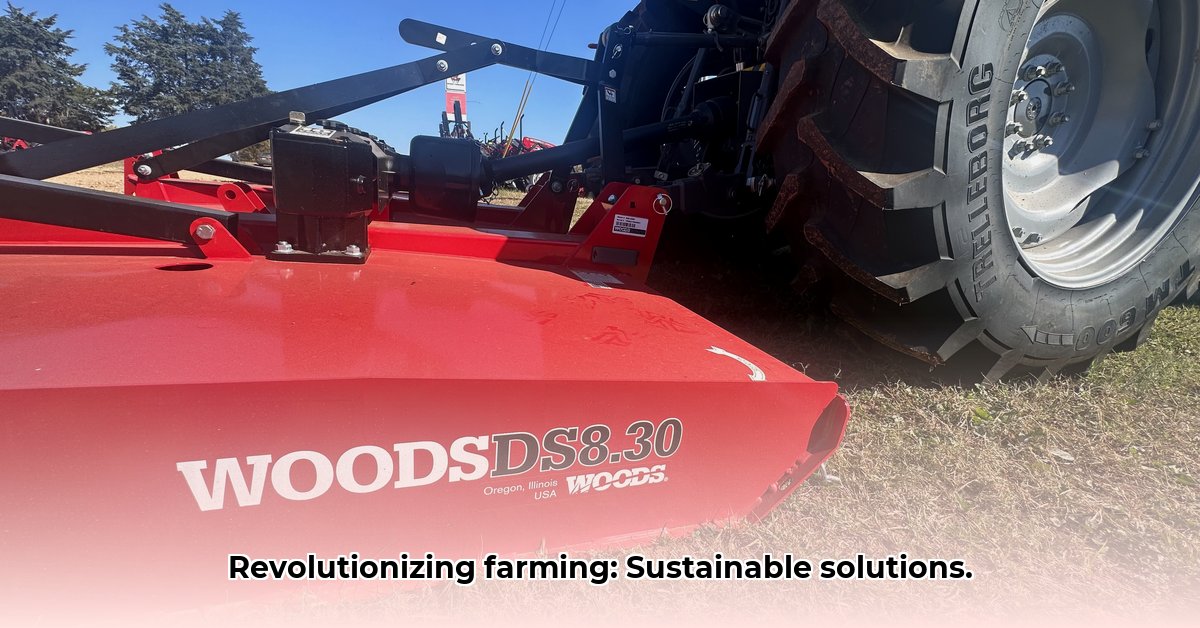
Extending the Life of Farm Equipment: A Sustainable Strategy?
Nance Tractor & Implement's emphasis on pre-owned equipment contributes to sustainability by reducing the demand for new equipment manufacturing, thereby decreasing resource consumption and waste. However, older models may have lower fuel efficiency than newer counterparts, potentially offsetting some environmental benefits. This highlights the nuanced nature of sustainability; simply selling used equipment isn't a panacea, but a component of a broader strategy. A thorough lifecycle assessment is necessary to fully understand the environmental impact. How significant are these fuel efficiency differences in real-world farming operations? Further investigation into this trade-off is crucial. For more on tractor reviews, check out tractor reviews.
A Wide Range of Equipment: Meeting Diverse Farming Needs
Nance Tractor's diverse inventory suggests a potential for catering to various farming styles, including those focused on sustainable practices. However, the specific equipment offered that directly supports sustainable methods (e.g., precision farming tools for optimized fertilizer and pesticide application) requires further clarification. While broad inventory is a positive, detailed information on the availability of equipment explicitly designed for eco-friendly farming is needed for a complete assessment. Does their range include technologies for reduced water usage or soil conservation? Such details would enhance understanding of their sustainability impact.
Beyond the Equipment: Promoting Sustainable Farming Practices
Nance Tractor's current marketing doesn't prominently feature sustainability initiatives. This represents a significant untapped opportunity. Proactive promotion of eco-friendly farming techniques through their marketing channels (website, social media, etc.), could significantly enhance their impact. Partnering with organizations focused on sustainable agriculture or highlighting the environmental benefits of specific equipment in their marketing materials would strengthen their commitment to sustainability. What marketing strategies could most effectively reach and engage local farmers? This warrants further analysis.
Comparing Nance Tractor to the Competition: Setting a Benchmark
A comparative analysis with other regional equipment providers is critical for evaluating Nance Tractor's position within the sustainable agriculture landscape. This requires a comprehensive comparison of several key aspects: the proportion of pre-owned equipment offered, the fuel efficiency of their inventory, and the availability of equipment specifically designed for sustainable farming practices. Such an analysis would provide valuable context and allow for a more informed assessment of their performance relative to competitors. Are there industry benchmarks for sustainability in agricultural equipment sales? The establishment of such metrics would improve the evaluation process.
Recommendations for a More Sustainable Future: A Collaborative Effort
To enhance sustainability within the South Carolina agricultural sector, a collaborative effort is required. Specific actionable steps for various stakeholders include:
Nance Tractor: Enhance online inventory details, showcase eco-friendly equipment options, and actively promote sustainable practices. Partner with eco-conscious technology firms for future equipment offerings.
Local Farmers: Prioritize equipment maintenance to extend lifespan, explore financing options for sustainable upgrades, and adopt new technologies to minimize their environmental impact.
Massey Ferguson: Support Nance Tractor's sustainability initiatives through joint marketing campaigns that highlight the eco-friendly features of their equipment.
South Carolina Regulatory Bodies: Strengthen environmental regulations and compliance enforcement, and create incentives for sustainable farming practices.
Keeping Up with Regulations: Environmental Compliance
Adherence to South Carolina's regulations on agricultural equipment emissions and waste is crucial for Nance Tractor's ethical operation and reputation. Maintaining compliance not only avoids potential penalties but also builds customer trust and demonstrates a commitment to responsible business practices. What specific regulations are most impactful for Nance Tractor, and how can they strengthen their compliance measures? This area needs additional scrutiny.
Conclusion: The Path Toward a Greener Future in Agriculture
Nance Tractor plays a significant role in South Carolina farming. Their provision of pre-owned equipment is a positive step towards sustainability. However, by actively promoting sustainable practices and engaging in collaborative efforts, they can significantly increase their contribution to a greener agricultural sector. Further research into the long-term impact of their practices is essential to determine the full extent of their contribution to a sustainable future. This case study demonstrates the potential for positive change, but also highlights critical areas requiring further improvements and expanded investigation.